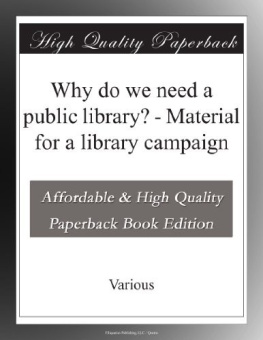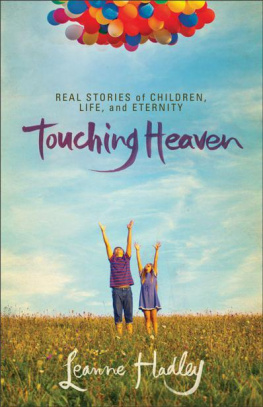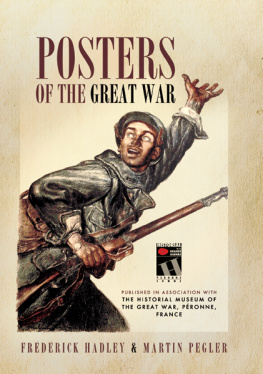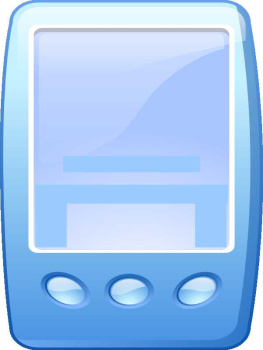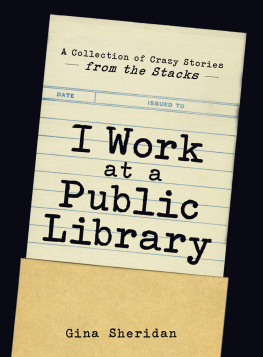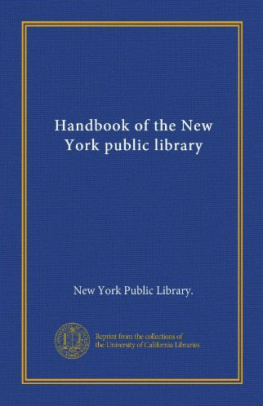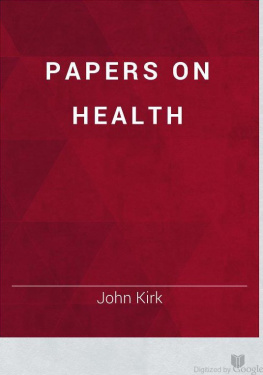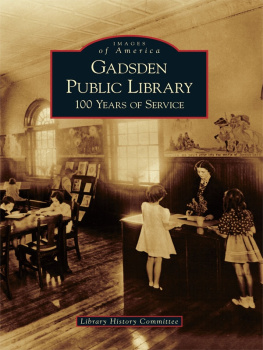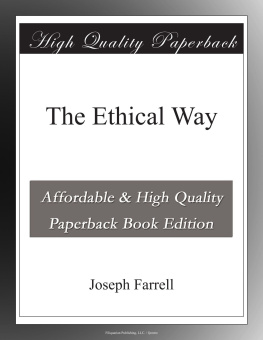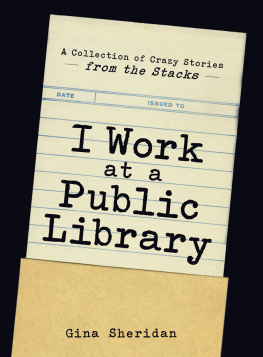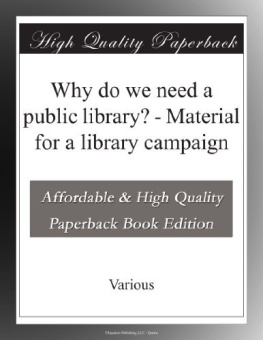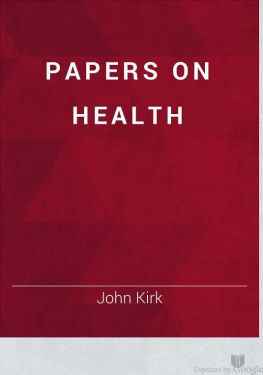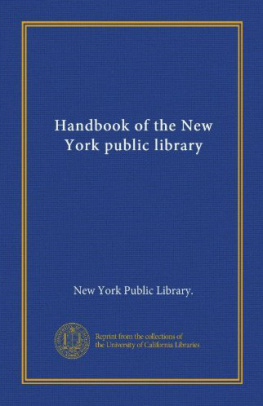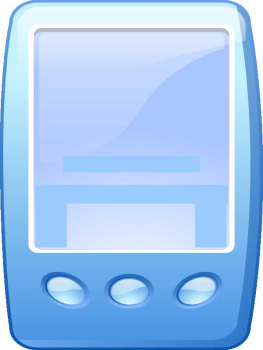The Project Gutenberg EBook of Why do we need a public library?, by Various
This eBook is for the use of anyone anywhere at no cost and with
almost no restrictions whatsoever. You may copy it, give it away or
re-use it under the terms of the Project Gutenberg License included
with this eBook or online at www.gutenberg.net
Title: Why do we need a public library?
Material for a library campaign
Author: Various
Editor: Chalmers Hadley
Release Date: March 24, 2010 [EBook #31760]
Language: English
*** START OF THIS PROJECT GUTENBERG EBOOK WHY DO WE NEED A PUBLIC LIBRARY? ***
Produced by Martin Pettit and the Online Distributed
Proofreading Team at http://www.pgdp.net (This file was
produced from images generously made available by The
Internet Archive/American Libraries.)
LIBRARY TRACT, No. 10
Revised Edition of
Tract No. 1
WHY DO WE NEED A PUBLIC
LIBRARY?
MATERIAL FOR A LIBRARY CAMPAIGN
Compiled by
CHALMERS HADLEY
Sec'y American Library Association
AMERICAN LIBRARY ASSOCIATION PUBLISHING BOARD
1 WASHINGTON STREET, CHICAGO
1910
PUBLICATIONS OF THE
AMERICAN LIBRARY ASSOCIATION
PUBLISHING BOARD
Postage on book publications extra
Guide to reference books, by Alice B. Kroeger.
New and enlarged edition. Cloth, $1.50.
Literature of American history; edited by J. N.
Larned. Cloth, $6.00. Supplements for 1902,
1903, paper, each $1; for 1904, 25c.
A. L. A. Index to general literature. Cloth, $10.
A. L. A. Index to portraits. $3.
A. L. A. Catalog. Paper, $1.
A. L. A. Catalog rules. Cloth, 60c.
A. L. A. Booklist (monthly, 10 numbers) $1 a year
List of subject headings for use in dictionary catalogs.
Cloth, $2.
Books for girls and women and their clubs.
Paper, 25c. Also issued in five parts, small
size, 5c. each.
Reading for the young, with supplement. Sheets,
$1.
Books for boys and girls, by Caroline M. Hewins.
Paper, 15c. $5 per 100.
Children's reading. Paper, 25c.
Small library buildings. Paper, $1.25.
Library buildings, by W. R. Eastman. Paper, 10c.
(Continued on 3rd cover page)
LIBRARY TRACT, No. 10
Revised Edition of
Tract No. 1
WHY DO WE NEED A PUBLIC
LIBRARY?
MATERIAL FOR A LIBRARY CAMPAIGN
Compiled by
CHALMERS HADLEY
Sec'y American Library Association
AMERICAN LIBRARY ASSOCIATION PUBLISHING BOARD
1 WASHINGTON STREET, CHICAGO
1910
Compiled from articles and addresses by
| Sir Walter Besant |
| E. A. Birge, dean University of Wisconsin, Madison, Wis. |
| William J. Bryan |
| John P. Buckley |
| Waller Irene Bullock, chief loan librarian Carnegie Library, Pittsburg, Pa. |
| James H. Canfield, late librarian Columbia University Library, New York |
| Andrew Carnegie |
| Winston Churchill |
| Frederick M. Crunden, ex-librarian Public Library, St. Louis, Mo. |
| J. C. Dana, librarian Free Public Library, Newark, N. J. |
| Melvil Dewey, ex-director N. Y. State Library, Albany |
| William R. Eastman, chief Division of Educational Extension, State Library, Albany, N. Y. |
| Mrs. S. C. Fairchild, ex-vice director New York State Library School, Albany, N. Y. |
| W. I. Fletcher, librarian Amherst College Library, Amherst, Mass. |
| W. E. Foster, librarian Public Library, Providence, R. I. |
| Chalmers Hadley, secretary American Library Association, Chicago, Ill. |
| Joseph Le Roy Harrison, librarian Providence Athenum, Providence, R. I. |
| Caroline M. Hewins, librarian Public Library, Hartford, Conn. |
| F. A. Hutchins, University Extension Department, University of Wisconsin, Madison, Wis. |
| J. N. Larned, ex-librarian Public Library, Buffalo, N. Y. |
| Henry E. Legler, librarian Public Library, Chicago, Ill. |
| James Russell Lowell |
| William McKinley |
| Theodore Roosevelt |
| C. C. Thach, president Alabama Polytechnic Institute |
| Alice S. Tyler, secretary Iowa Library Commission, Des Moines, Iowa |
| Irene Van Kleeck |
MATERIAL FOR A PUBLIC LIBRARY CAMPAIGN
One of the most effective means of conducting a library campaign, especially in its early stage, is through the press. Not only will the reading and thinking part of the people thereby be reached, but any library editorial appearing in a newspaper, will, because of the public notice given it, receive greater consideration than if printed elsewhere. Library Commission workers and library supporters in general, have felt the need of printed material which could be made immediately available in a library campaign. Most library addresses and articles are too long, too scholarly in treatment or have lacked that crisp style necessary for use in the press.
Editors of newspapers are slow to accept for printing, signed editorials which have seen service elsewhere. It is suggested that the material here compiled be made as local as possible in its application to individual communities, and that the editorials be sent to newspapers unsigned by the original writers. The same editorials should not be sent to neighboring communities, at least in their original form. Every attempt should be made to have them appear as fresh and spontaneous as possible. Different editorials should always be sent the several papers in the same city.
The material here compiled is suggestive and sufficiently comprehensive to meet ordinary conditions. Much valuable material has been taken from circulars sent out by the Library Commissions of Oregon, Wisconsin and Iowa.
No better advice could be given in opening a public library campaign through the public press than the following, in the Wisconsin Free Library Commission Circular of Information, No. 5:
1 Citizens of believe in free public libraries. They need organization and courage to attack local problems rather than long homilies on the value of good literature.
2 Public sentiment needs time to ripen. Frequent short articles running through the issues of a few weeks are better than a few long ones.
3 Make the articles breezy, optimistic, with local application. You can get a library if you are in earnest.
4 Appeal to local pride. Civic patriotism is the basis of civic improvement. Give the names of familiar towns of similar size which have good libraries.
5 Do not rely solely on editorials. Get brief communications from citizens, but have each letter make only one point, and that crisply.
6 Do not waste space rebutting trivial arguments. Refute them by affirmative statements.
7 Get brief interviews with visitors from towns where they have good libraries, and with your own townsmen who have visited neighboring libraries.
8 Keep this fact in mindYour people want a library and only need pluck and a leader.
9 Remember that the worst enemy of the movement is the talker who wants a library very much, in the "sweet bye and bye," when all other public improvements are completed.
10 When it is time to strikestrike hard. Apologies and faint hearts never won any kind of a contest.
CHALMERS HADLEY,
Secretary American Library Association.
WHAT A PUBLIC LIBRARY DOES FOR A COMMUNITY

